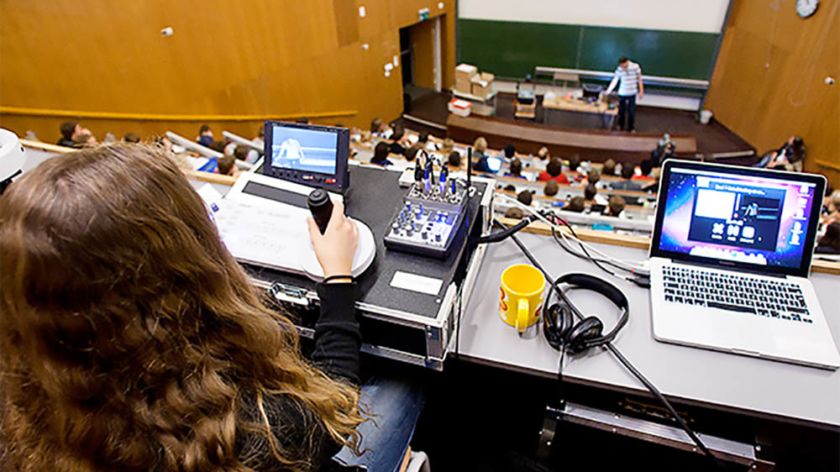-
 Photo: Dick van Aalst
Photo: Dick van Aalst
The corona regulations for education have already been gone a few weeks, but the lecture halls aren’t yet as full as they were before. Vox asked three teachers what this means for lectures in the future. ‘We need to campaign to get students back into the lecture halls.’
Roughly 120 first years signed up for the biology programme this academic year, but this is not reflected in the lecture halls. ‘These days, my lectures are attended by about thirty students’, according to Professor Hans de Kroon. ‘The rest all follow the livestream or watch the web lectures afterwards. That takes some getting used to; before all this, 80 to 90 percent of students were present in class.’
Marijtje Jongsma, associate professor of Psychology, has had similar experiences. She teaches a BA course to 90 students, of whom only twenty are in the lecture hall. ‘And a lot of colleagues tell me similar stories’, she says. Steven Bartels, professor in Civil Law, is also used to pulling in bigger crowds that the 60 to 80 students attending currently; the largest hall in the Grotius building has room for 380 students.
The low number of attending students cannot be explained by just the corona crisis, according to Bartels. ‘The housing crisis has made it more difficult to find a room in Nijmegen, and so more students are still living at home’, he says.
‘There were already fewer people coming to class before the corona crisis, especially when we started using web lectures’, De Kroon agrees. ‘It is much more convenient for students who live in Breda or Tilburg to watch lectures that start at half past nine from home.’
No Murmur
The three teachers we interviewed all remark that, for the moment, only the most motivated and interested students come to the lecture hall. ‘But I prefer all students to be present, even if not everyone pays attention. If I have to get up early, they can do the same’, De Kroon says with a smile. Bartels agrees: ‘I don’t like working up a sweat for a lecture hall with 30 students.’
‘A larger group of students join via livestream and chat’
Jongsma does enjoy having fewer students in the lecture hall. ‘There’s more than enough space between people, there is no murmur, and the students are genuinely interested. A larger group of students join via livestream and chat. That way I receive a lot more questions than I did before. For a lot of those students this has made it easier to ask questions.’
The psychology teacher points out that this new form of lecture has its advantages. ‘This course is attended by a host of students and teachers from a partner university in Indonesia. Through group assignments students of different universities come into contact with an international classroom.’
Being disrupted
Last academic year, Bartels taught almost all of his classes online due to Corona. ‘but I much prefer my contact with students in in-person lectures’, he says. ‘Academic education is not just learning what somebody else already knows; it’s learning how to think, being disrupted, becoming curious for differing cases, talking to each other, and improving each other. I think the most fun aspect of lectures is the sense that you’ve set people thinking, that they will leave with new thoughts or insights. Sometimes that works, sometimes it doesn’t.’
‘If you can tell a story with great enthusiasm, you can get students interested in the core of a subject’
According to Hans de Kroon, a good lecture should grab students by connecting basic knowledge to your fascination for the subject. Every lecture, I use a few recent examples from mine or my colleagues’ work’, he says. ‘Then I let students perform tasks. If you can tell a personal story with great enthusiasm, you can get students interested in the core of a subject. I don’t know if that can be done any other way. You don’t have this dynamic online.’
Of those interviewed, Marijte Jongsma is the only one who wonders if in-person classes are really always better. ‘This is often stated, but I seldom hear good arguments for it’, she says. ‘I do think interactive education is a must. Putting recorded lectures online has little to do with education in my view, and is mostly based on the misconception that teaching is simply disseminating information. Teaching is interacting, stimulating, getting people excited, reading people and being together. It doesn’t matter if this happens on campus or online.’
Thuisbezorgd.nl
Are large lectures a thing of the past? Professor of Biology Hans de Kroon thinks that lasting change is happening. ‘The quality of our recordings and web lectures is more than excellent. If the way I teach classes and get students excited for the material works online, then we will have to adapt. Now I give fewer lectures and have students do more group assignments. I then discuss their answers in an online seminar.
‘Perhaps this is a new development we discovered during the pandemic that is just more effective’, Marijtje Jongsma agrees. ‘I can imagine that this is the case when you can follow a lecture via livestream from the comfort of your own bed, and you can ask questions in chat without embarrassment. Blended forms of education allow students the possibility to choose the form that fits them best. It can lead to greater access and more diversity.
Steven Bartels does not agree with his colleagues. He thinks it is too early to conclude that large lectures are on the way out. ‘The problem is that students have now gotten used to a ‘Thuisbezorgd.nl’-style of education, that doesn’t challenge them. As long as we keep the livestreams running, it’s going to take a lot of effort to pull them back to the lecture halls.’
‘You have to promote that an academic education is more than just passively listening to classes’
The professor of law does think that the university should try to convince students of the value of lectures again. ‘We need to campaign to get people back into the lecture halls. We have to promote that an academic education is more than just passively listening to classes. I will be discussing this with my faculty’s administration.’
De Kroon also sees a different way to lure students back into the lecture halls. ‘Perhaps we can get more students to attend campus by scheduling lectures an hour later, or right before group work’, he says. ‘But I think that making lecture attendance mandatory is a bad idea.’






